First Posted October 2015
Albion
has a composite character second to none. It means (originally)
England, but at a deeper level it means the cosmos, which is a man!. (In
this Blake agrees with the Adam Kadmon of the Kabbalah, the Heavenly Man of Philo, St. Paul's heavenly man, the second Adam, and the cosmic man of Jung's psychology, and the Hindu god, Krishna.)
Blake's Albion, the eternal man, fell asleep into mortality in Beulah. We read at the beginning of Night 2 of the Four Zoas these ominous words:
- "Rising upon his Couch of Death Albion beheld his Sons
Turning his Eyes outward to Self, losing the Divine Vision. Albion called Urizen & said:
"Take thou possession! take this Scepter! go forth in my might
For I am weary, & must sleep in the dark sleep of Death."
This dissolution of the cosmic man is described at the beginning of
the Four Zoas. He passes through the Circle of Destiny, and at the end of
the Four Zoas he awakens from his mortal sleep and resumes his place in
Eternity. That in essence is a thumbnail account of Blake's myth:
descent from Eternity, struggle, and eventually return.
.jpg) |
Wikipedia Commons Jerusalem Plate 76, Copy A Albion Jesus |
*****************************************************************
From Wikipedia, the free encyclopedia
This article is about the archaic name for Great Britain. For other uses, see Albion (disambiguation).
Not to be confused with Alban.
Albion (Ancient Greek: Ἀλβίων) is the oldest known name of the island of Great Britain. Today, it is still sometimes used poetically to refer to the island. The name for Scotland in the Celtic languages is related to Albion: Alba in Scottish Gaelic, Alba (genitive Alban, dative Albain)in Irish, Nalbin in Manx and Alban in Welsh,Cornish and Breton. These names were later Latinised as Albania and Anglicised as Albany, which were once alternative names for Scotland.
New Albion and Albionoria ("Albion of the North") were briefly suggested as names of Canada during the period of the Canadian Confederation.[1][2] Captain Arthur Phillip originally named the Sydney Cove "New Albion", but for uncertain reasons the colony acquired the name "Sydney."


No comments:
Post a Comment